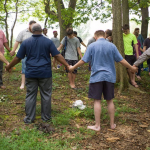Photo above by itakdalee, via Getty Images/Canva
Article by Peter Koeppel, member of Trinity Memorial Church in Binghamton and the diocesan Stewardship Resources team.
How long, O Lord? Will you forget me forever?
How long will you hide your face from me?
Psalm 13:1
“How much longer” – a question that has been around for as long as humans have shaped the way they live on God’s earth.
“How much longer,” asked Marcus Tullius Cicero in 63 BC in the Roman Senate, at the brink of a civil war. Bob Dylan gave the question an unforgettable form in his 1963 song “Blowin’ in the Wind,” asking how much longer we are willing to tolerate war, lack of freedom, unwillingness to see injustice, inability to hear people’s cry.
The question isn’t new; yet, here we are, still and again, asking: how much longer are we willing to tolerate the systemic injustice heaped upon our African-American siblings in Christ, before we, like Cicero in 63 BC, declare: enough is enough, stand up and stand with them for their rights?
The injustice continuing to be placed on our African-American siblings in Christ is so often the result of laws, regulations, customs, habits, and choices made by people. Why, we should ask, are there fewer African-Americans in business leadership positions, but more in jails, than their share of the population suggests? Why do African-American parents have to sit down with their children to have “the talk” – not about sexuality, but about them not being able to do safely what their white friends do? Why do some neighborhoods and schools end up segregated again, fifty years after school integration began, and redlining was outlawed? Why do African-Americans need to fear interacting with the police, while whites rarely do? Why do African-Americans have worse health than whites? We could continue for a long time… This list, in the end, touches on every aspect of daily life.
These laws, regulations, customs, habits, and choices may have been made and enacted on our watch, or long before our watch; but having been made by humans, they reflect all that’s good and bad in human thought, sentiment, and habit. Whether they were codified in our times, or before our times, we carry the responsibility for their continued use, application, and enforcement in these, our, times. And where they are unjust, where they oppress people, we, as people of God, are called upon to to stand up, peacefully yet powerfully at the same time, to demand change. Peacefully speaking truth to power is a fundamental obligation of Christians.* It’s also one of the hardest things to do, as we expect, if not fear, that power will attempt to suppress truth, and those speaking it. But if not now, when? How much longer, how many more times, will we let fear cause us to be silent, to look the other way, to not hear the people’s cry?
As we decide on our own role in in providing for a just, fair, and ultimately loving society for our African-American siblings in Christ, 1 Corinthians 12 reminds us: some of us may be called upon to heal the wounds being inflicted; others may be called upon to prevent wounds from being inflicted; others may be called upon to set us on a path for justice and fairness for our African-American siblings in Christ; yet others may be called upon to share the message of God’s love for all, so that we know that our strength to right what’s wrong comes not merely from within ourselves, but that we’re backed up by the ultimate power: God’s love.
Let us take God’s love, let it be reflected in us, as we use it to give us the strength to write a new chapter in this country’s history, in which our African-American brothers and sisters know that they are embraced, supported, held up, and loved as equals in all aspects of law, justice, economics, society, and life.
It’s time we stop the answer from blowin’ in the wind. God calls upon all of us to make it so.
*See Diocese of Central NY: Way of Love: Rule of Life nyepiscopal.org/cny-way-of-love


